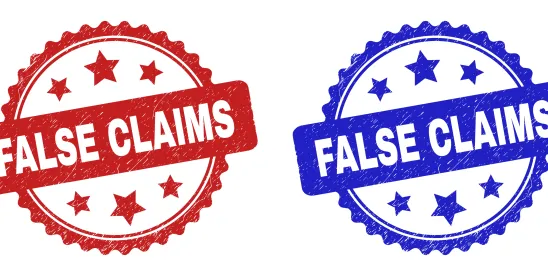Headlines that Matter for Companies and Executives in Regulated Industries
District Court Declines to Stay Case Pending Resolution of FCA Causation Standard Issue Before Court of Appeals
Earlier this week, a Massachusetts federal judge denied a motion to stay proceedings filed by Medtronic, Inc. and Medtronic Minimed, Inc. (collectively, Medtronic) in a False Claims Act (FCA) suit that has been pending since 2011.
The lawsuit stems from a qui tam action filed in May 2011 on behalf of the US government and numerous states, in which the whistleblower alleged that Medtronic used illegal promotional practices to market and sell devices for the treatment and management of diabetes. The complaint specifically alleges that many of these illegal practices target Medicare patients on multiple daily injections of insulin (MDI) therapy. Among other things, the complaint states that Medtronic engaged in off-label promotion of its diabetes devices, violated the Anti-Kickback Statute (AKS) by providing health care professionals with financial inducements to refer, recommend, or arrange for the purchase of Medtronic diabetes devices, and engaged in other fraudulent and deceptive schemes to sell its diabetes devices.
In May, Medtronic filed its motion to stay proceedings to allow the company time to resolve pending appellate proceedings, which concern the district judge’s partial denial of Medtronic’s motion for summary judgment. Specifically, Medtronic has challenged the causation standard utilized by the court for providing a FCA claim premised on a violation of the AKS. Medtronic contends that the court should have applied a strict “but for” causation standard, but instead applied an incorrect “sufficient casual” standard.
Notably, the question of which standard is correct is currently pending before the First Circuit Court of Appeals in two other matters involving Teva Pharmaceuticals and Regeneron Pharmaceuticals, Inc., in which the outcome could have a significant impact on the Medtronic case. While Medtronic argued that the First Circuit would benefit from considering the immediate issue alongside those cases, the district court determined that the best course of action was to keep the Medtronic case moving forward.
The outcome of all three cases should be monitored.
The Medtronic case is US et al. ex rel. Witkin v. Medtronic Inc. et al., 1:11-cv-10790 (D. Mass. 2011). The district court’s order denying the stay was issued on June 5, Docket Entry 292.
Duo Convicted in Mass-Mailing Fraud Scheme
Last week, a jury found two former employees of Epsilon Data Management LLC guilty of conspiracy to commit mail and wire fraud, as well as additional counts of substantive mail and wire fraud. Their conviction follows the 2018 guilty plea of a former Epsilon vice president for his participation in the same scheme.
Robert Reger, a former Epsilon senior executive, and David Lytle, a former Epsilon sales manager, participated in a scheme where targeted lists of consumers and their addresses were sold to perpetrators of other schemes that sent false and deceptive mail to consumers. Reger and Lytle used their positions at Epsilon, a data broker, to obtain the consumer data that was then passed along to other fraudsters. All told, Reger and Lytle sold the names and addresses of millions of US consumers to perpetrators of mail fraud schemes.
According to prosecutors, Reger and Lytle utilized “Epsilon’s algorithms to predict new lists of consumers most likely to respond to the frauds” and their “business unit worked with dozens of clients with scam letters promising large prizes or falsely personalized astrological mailings promising wealth.” The clients specifically targeted elderly and vulnerable individuals for these schemes.
A sentencing hearing is scheduled for September 30, with Reger and Lytle both facing a maximum penalty of 20 years in prison for each count.
The US Department of Justice’s (DOJ) press release is available here.
Massachusetts Surgeon Agrees to Pay $200,000 to Resolve AKS and FCA Allegations
Federal prosecutors announced last week that a Massachusetts orthopedic surgeon has agreed to pay $200,000 to resolve allegations that he violated the AKS and the FCA.
Per the settlement agreement, Dr. Tony Tannoury knowingly and willfully solicited and received free products worth over $100,000 from DePuy Synthes, Inc. and DePuy Synthes Sales, Inc. (collectively, DePuy) (1) in return for his ordering, arranging for, and recommending the use of DePuy medical devices for use in spine surgeries performed on Medicare and Medicaid patients, or (2) to reward his usage of DePuy products in such surgeries.
This settlement follows a January 2023 settlement agreement with DePuy, under which the company agreed to pay $9.75 million to resolve allegations of providing illegal kickbacks to Dr. Tannoury.
The DOJ’s press release is available here.
Cryptocurrency Ponzi Scheme Promoter Pleads Guilty
Earlier this week, federal prosecutors announced that a senior promoter in the cryptocurrency Ponzi scheme known as Forcount, later known as Weltsys, pleaded guilty to conspiracy to commit wire fraud. According to prosecutors, Forcount, a purported cryptocurrency mining and trading company, lured in victims with promises of earned profits — such as guaranteed daily returns and doubling investments within six months — in exchange for purchases of supposed cryptocurrency‑related investment products.
Juan Tacuri was one of the scheme’s most successful promoters, bringing in millions of dollars from his participation. Per the prosecutors, Tacuri traveled throughout the United States, hosting “lavish expos” and small community presentations aimed at luring victims. Prosecutors described that, following an investment, victims of the scheme would gain access to an online portal where they could monitor returns. Although the portal reflected profits, most victims were unable to withdraw any amount and ultimately lost their entire investment. Prosecutors noted that, in contrast, promoters like Tacuri “siphoned off, in some cases, hundreds of thousands of dollars in [v]ictim funds, which they withdrew as cash, spent on promotional expenses for the schemes, and used for personal expenditures such as luxury goods and real estate.”
When victims began to lodge complaints about their inability to withdraw funds, prosecutors noted that individuals such as Tacuri offered excuses and delays, continuing to promote the fraudulent scheme and accept further investments. Prosecutors further stated that, “[a]s complaints mounted, Forcount began offering proprietary crypto-tokens for sale as a means of injecting liquidity into the scheme.” To entice victims to invest, Tacuri claimed that these crypto-tokens would be worth a significant amount of money when (eventually) companies accepted them as payment for goods and services.
Tacuri pleaded guilty to one count of conspiracy to commit wire fraud, which carries a maximum sentence of 20 years in prison. As part of his plea, Tacuri additionally agreed to forfeit almost $4 million in victim funds and certain real estate that he purchased using those funds.
The DOJ’s press release is available here.
This article was also authored by Shoshana Golden.








 />i
/>i

